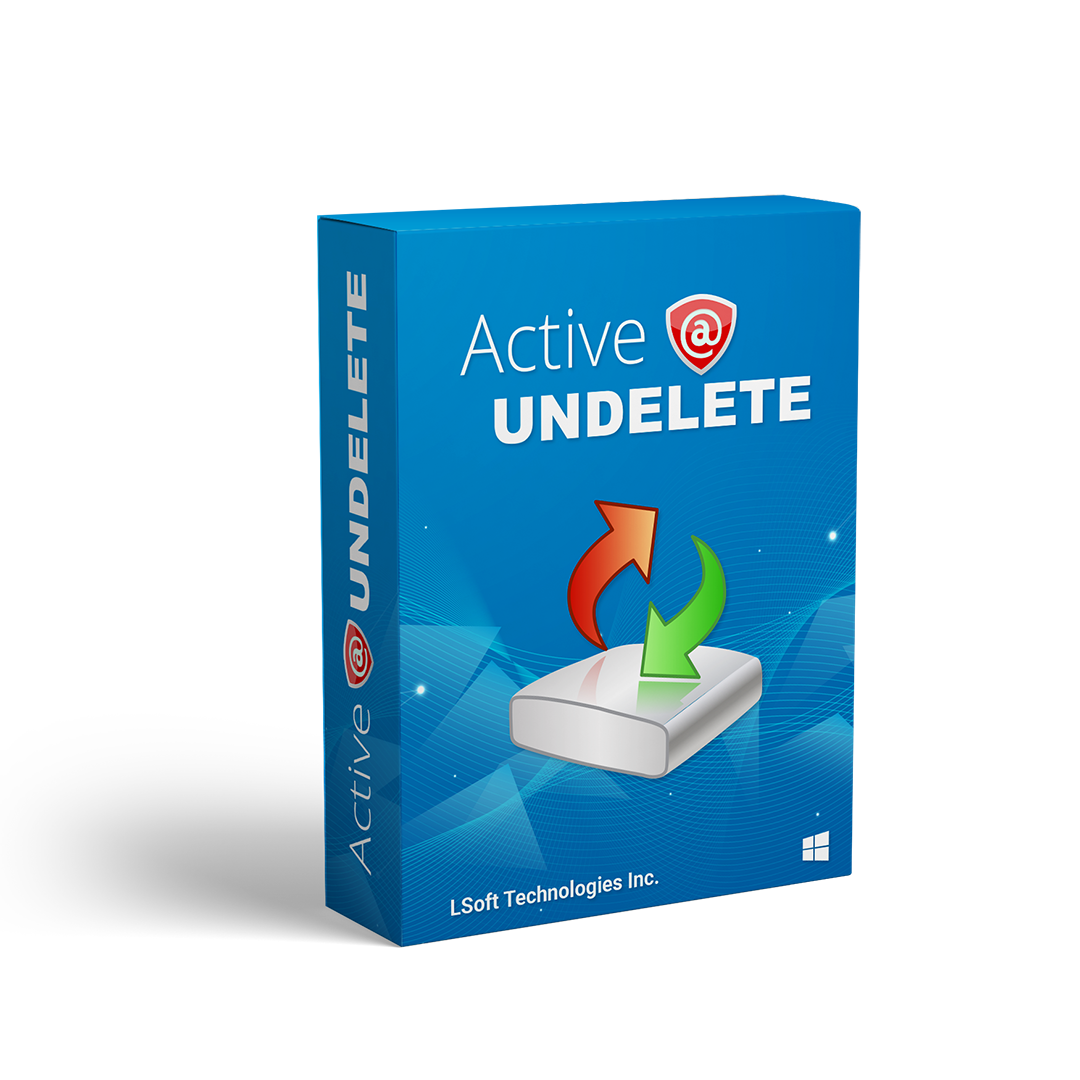Active@ UNDELETE: Automatic Recovery of Compressed Archives with File Signatures
Introduction
Active@ UNDELETE is a powerful data recovery software that offers a wide range of features to help users recover deleted or lost files. One of its standout features is File Signatures, which enables the software to detect and restore files based on their unique structures and markers. In this article, we will explore how Active@ UNDELETE's File Signatures can aid in scanning and recovering various compressed archive file types, including 7z, arc, arj, cab, gz, lzh, tar, rar, zip, zoo, xz, lz4, and bz2.
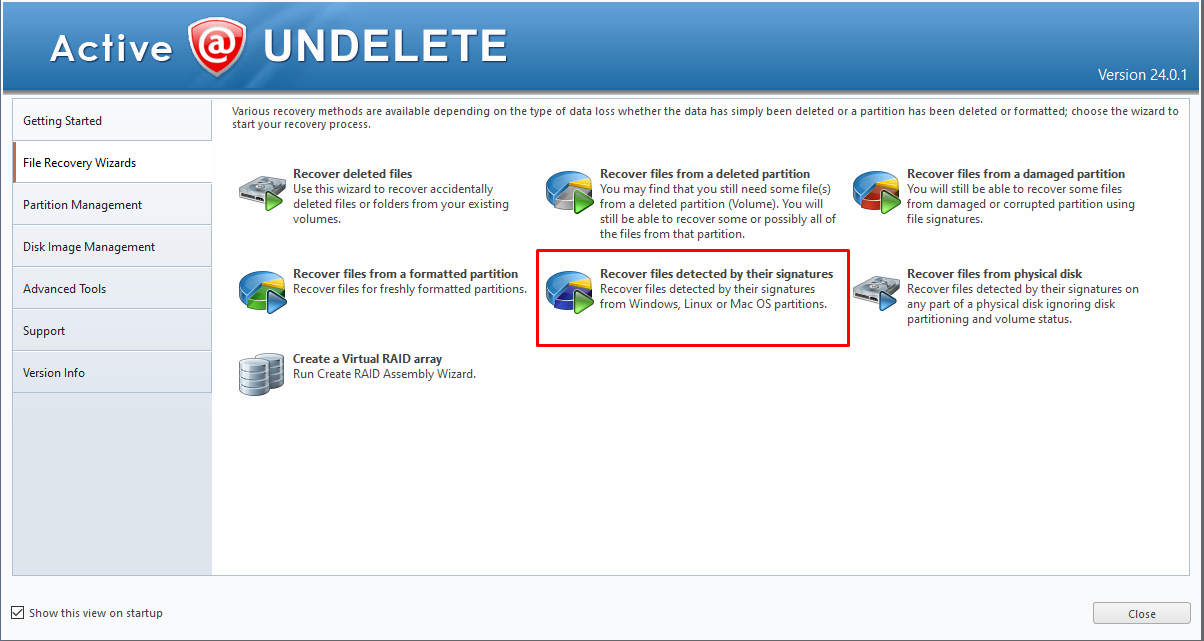
Recover 7z files with Active@ UNDELETE
- History: The 7z file format was introduced in 1999 by Igor Pavlov as part of the 7-Zip archiving tool. It was designed as an open-source, high-compression file format to provide an alternative to existing formats such as ZIP and RAR. 7z supports advanced compression algorithms like LZMA, LZMA2, and Bzip2, allowing it to achieve higher compression ratios than its counterparts. Over the years, 7z has gained popularity due to its ability to handle large files efficiently while maintaining data integrity. It is widely used for file backup, distribution, and software packaging.
- Active@ UNDELETE and File Signatures: Active@ UNDELETE's File Signatures feature recognizes the distinctive structure of 7z files, allowing it to efficiently scan storage devices and recover deleted or damaged 7z archives. Whether accidental deletion or file system corruption causes the loss, Active@ UNDELETE empowers users to retrieve their valuable 7z files effortlessly and securely. To scan, and later recover 7z files check them in UNDELETE’s File Recovery wizard.
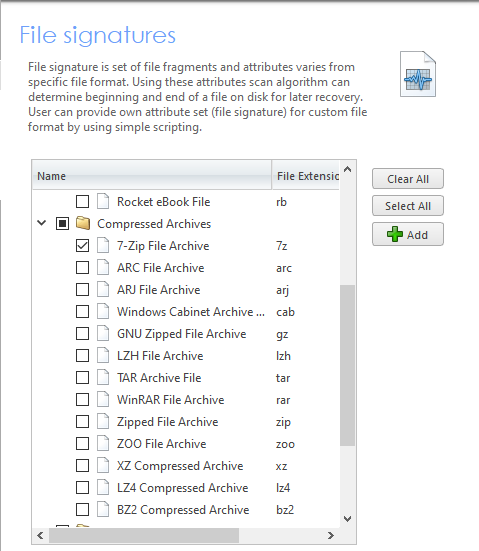
Recover ARC files with Active@ UNDELETE
- History: The ARC file format was created in the 1980s by Phil Katz as a successor to his earlier ZIP format. It gained popularity with the release of PKARC, a compression utility program. ARC files employ a simple compression algorithm that uses binary tree sorting techniques. However, the format faced challenges due to patent issues, leading to the emergence of alternative formats like ZIP. Consequently, ARC files have become less prevalent, but they still find limited use in certain legacy applications.
- Active@ UNDELETE and File Signatures: Active@ UNDELETE's File Signatures effortlessly identifies the unique markers and structure of ARC files, making it possible to restore deleted or lost ARC archives with ease. With just a few clicks, users can recover valuable data from ARC files, salvaging important information from the past. Scan for ARC files by selecting them in UNDELETE’s Scan options, under Detect files by their signatures option.
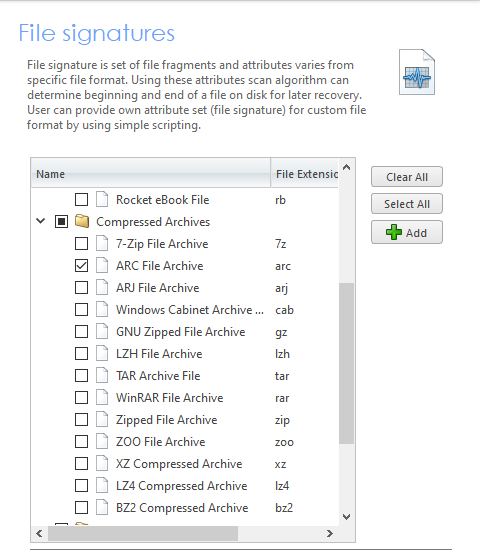
Recover ARJ files with Active@ UNDELETE
- History: Developed in the 1990s by Robert K. Jung, ARJ (Archived by Robert Jung) is a file compression and archiving format. ARJ gained popularity for its ability to create multi-volume archives, error recovery capabilities to some extent, and support for long filenames. However, with the rise of ZIP and other formats, the usage of ARJ declined sharply, and it is now considered obsolete.
- Active@ UNDELETE and File Signatures: Thanks to the advanced algorithms within Active@ UNDELETE's File Signatures, recovering deleted or corrupted ARJ archives has never been easier. By comprehensively scanning storage devices, Active@ UNDELETE can restore crucial ARJ files even in the face of unexpected data loss situations. For Active@ UNDELETE to find your CDC files make sure to select them in the wizard.
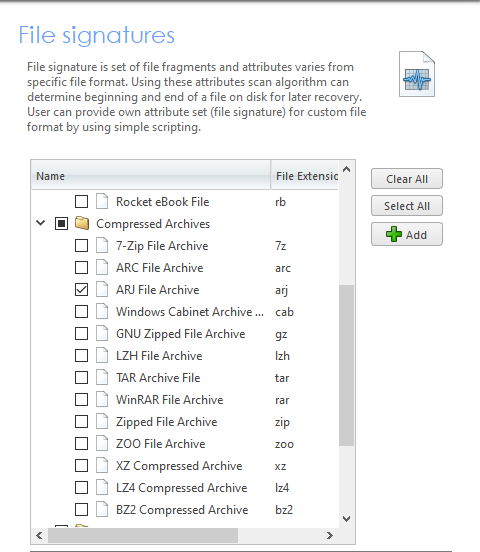
Recover CAB Files with Active@ UNDELETE
- History: CAB (Cabinet) files were introduced by Microsoft in the early 1990s. These files are used to package software components, system files, and installation resources. CAB files support compression algorithms like LZX, which provide efficient data compression for software distribution. They are commonly utilized for Windows installation packages, such as device drivers and system updates.
- Active@ UNDELETE and File Signatures: Active@ UNDELETE swiftly recognizes the distinctive signature of CAB files, making it a reliable tool for recovering deleted or damaged CAB archives. Users can conveniently restore their essential CAB files and regain access to crucial software installations or system components. The option for the CAB file signature can be checked in the Detect files by their signatures section.
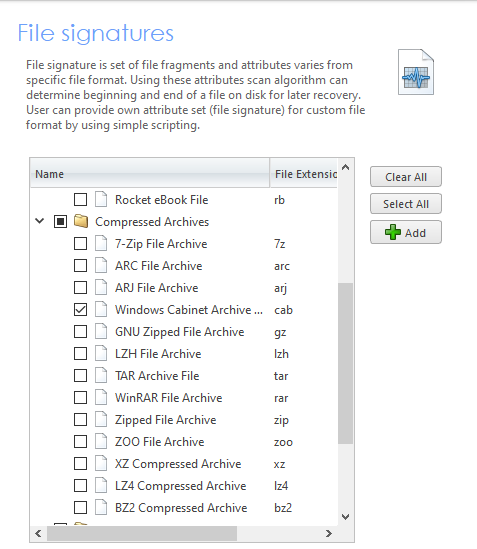
Recover GZ files with Active@ UNDELETE
- History: GZ is a file format that uses the GNU zip compression algorithm, also known as gzip. Developed by Jean-Loup Gailly and Mark Adler in the early 1990s, GZ offers fast compression and decompression with a relatively good compression ratio. It has become the standard compression format for Unix and Linux systems. GZ files are often used for compressing individual files or combining multiple files into a single archive, but they lack the ability to store directory structures.
- Active@ UNDELETE and File Signatures: Active@ UNDELETE's File Signatures comprehensively searches for the unique structure of GZ files, enabling the recovery of accidentally deleted or damaged GZ archives. With Active@ UNDELETE, it becomes a hassle-free process to restore important GZ files and access valuable content stored within them. To access the GZ file signature option before the scan, make sure to check it in the File Recovery Wizard.
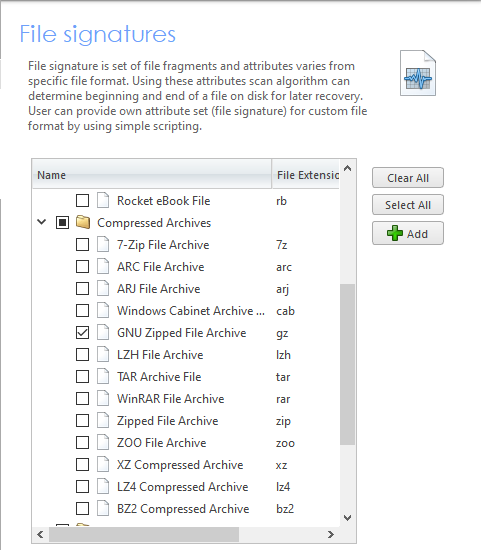
Recover LZH files with Active@ UNDELETE
- History: The LZH format, created by Haruhiko Okumura in the 1980s, is a compression format commonly used in the Japanese computing community. LZH combines the Lempel-Ziv-Welch (LZW) compression algorithm with Huffman coding to achieve high compression ratios. It was popular in the early days of personal computing and before the emergence of widely used formats like ZIP. LZH files typically contain multiple compressed files and maintain the original directory structure.
- Active@ UNDELETE and File Signatures:Active@ UNDELETE's File Signatures feature actively identifies the signature markers of LZH files, allowing for efficient recovery of accidentally deleted or corrupted LZH archives. With its seamless scanning capability, Active@ UNDELETE ensures the retrieval of vital LZH files, preserving memories from bygone eras. To find and recover LZH files select lzh in the File Recovery Wizard menu.
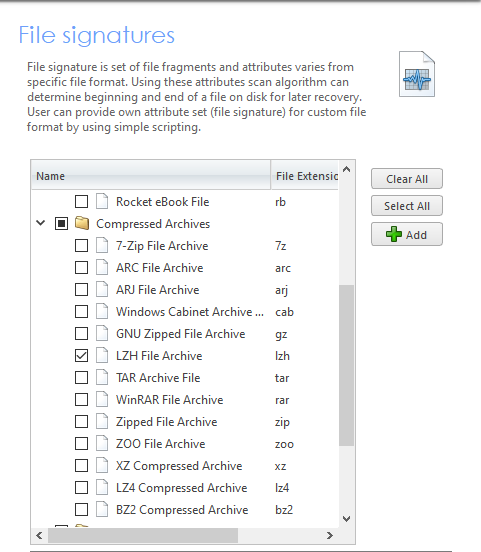
Recover TAR files with Active@ UNDELETE
- History: The Tape Archive (TAR) format dates back to the early days of computing. Originally developed for storing files on magnetic tape, TAR became widely adopted in Unix-based systems as a method for bundling multiple files and preserving file attributes and directory structures. TAR files do not perform compression by themselves and are commonly compressed using other formats like GZ or BZ2 to create compressed TAR archives.
- Active@ UNDELETE and File Signatures:Active@ UNDELETE harnesses the power of its File Signatures feature to detect and recover deleted or damaged TAR archives. With Active@ UNDELETE, users can effortlessly restore their TAR files and extract the valuable data encapsulated within them. To find and recover TAR files check tar in the File Recovery Wizard menu.
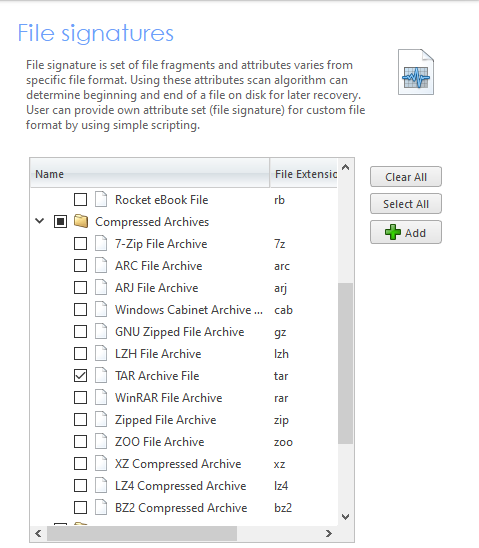
Recover RAR files with Active@ UNDELETE
- History: RAR (Roshal Archive) format was created in the early 1990s by Eugene Roshal. RAR files employ a proprietary compression algorithm that offers high compression ratios and the ability to split archives into multiple smaller volumes. RAR gained popularity due to its strong encryption capabilities, recovery records to repair damaged archives, and support for storing file ownership and file attributes. However, it is a closed-source format, and the RAR archiver software is not freely available.
- Active@ UNDELETE and File Signatures: Active@ UNDELETE's File Signatures effortlessly recognizes the unique structure of RAR files, facilitating the recovery of accidentally deleted or corrupted RAR archives. Users can rely on Active@ UNDELETE to restore their valuable RAR files and regain access to important data. To find and recover RAR files check jpx in the File Recovery Wizard menu.
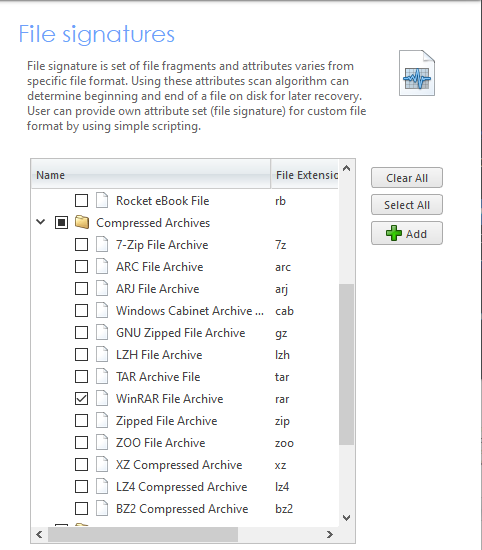
Recover ZIP files with Active@ UNDELETE
- History: ZIP, introduced by Phil Katz in 1989, is one of the most widely used file compression and archiving formats. ZIP supports various compression methods, including Deflate, which delivers a balance between compression ratio and speed. ZIP files can store multiple files, preserve directory structures, and include optional password-based encryption. ZIP format has become a de facto standard due to its native support in multiple operating systems and widespread compatibility.
- Active@ UNDELETE and File Signatures: ZIP files, developed by Phil Katz, are widely used to compress and archive files, making them popular for file distribution and storage. Active@ UNDELETE's File Signatures skillfully identifies the distinctive structure of ZIP files, allowing for the seamless recovery of deleted or damaged ZIP archives. With Active@ UNDELETE, users can effortlessly restore their ZIP files and retrieve valuable data within them. To find and recover ZIP files check zip in the File Recovery Wizard menu.
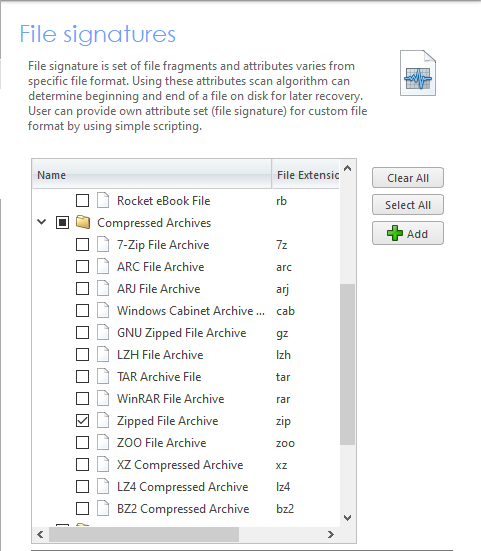
Recover ZOO files with Active@ UNDELETE
- History: ZOO format, developed in the mid-1980s by Rahul Dhesi, was designed as an alternative to other file compression formats at the time. ZOO archives consist of multiple compressed files and directories, encased in a single file. While ZOO offered comparable compression and archiving capabilities to its contemporaries, like ARC and ZIP, it ultimately fell out of favor due to limited support and the emergence of more popular formats.
- Active@ UNDELETE and File Signatures: Active@ UNDELETE's File Signatures feature effortlessly recognizes the unique markers and structure of ZOO files, enabling users to recover deleted or corrupted ZOO archives. Users can rely on Active@ UNDELETE to effortlessly restore their ZOO files and retrieve important data from the past. To find and recover ZOO files check zoo in the File Recovery Wizard menu.
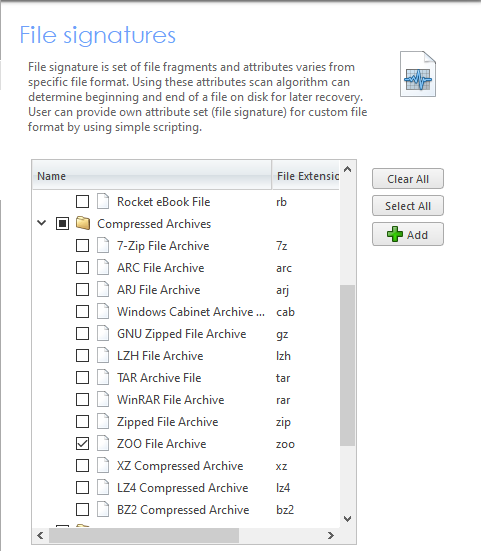
Recover XZ files with Active@ UNDELETE
- History: XZ file format emerged in the early 2000s as part of the XZ Utils, an open-source file compression and archiving software. XZ employs the LZMA2 compression algorithm, providing excellent compression ratios while maintaining fast decompression speeds. XZ files are commonly used in Unix and Linux systems as a replacement for GZ files, offering higher compression efficiency.
- Active@ UNDELETE and File Signatures: Active@ UNDELETE’s File Signatures feature becomes indispensable when it comes to recovering accidentally deleted or lost XZ files. Active@ UNDELETE can identify the unique file signature associated with M4P files, allowing for their precise detection and recovery, even when file system information is missing or damaged. To find and recover XZ files check xz in the File Recovery Wizard menu.
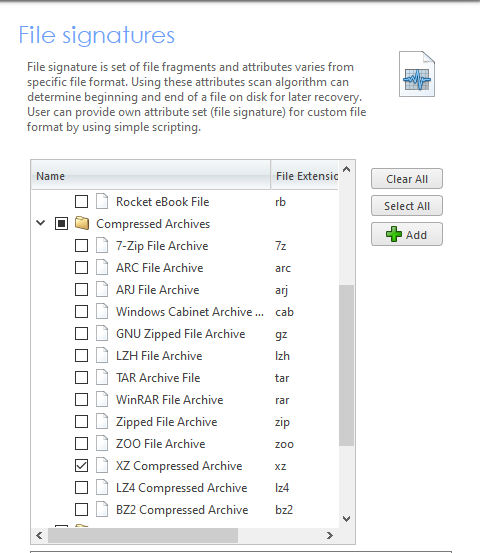
Recover LZ4 files with Active@ UNDELETE
- History: LZ4 is a relatively recent file compression format, released in 2011 by Yann Collet. It is known for its incredible compression and decompression speeds, making it suitable for applications requiring real-time compression or rapid data processing. LZ4 achieves this speed by trading off some compression ratio. It has gained popularity in scenarios such as network transfers, high-speed storage systems, and video game development.
- Active@ UNDELETE and File Signatures: Active@ UNDELETE's File Signatures seamlessly recognizes the unique structure of LZ4 files, facilitating the recovery of accidentally deleted or corrupted RAR archives. Users can rely on Active@ UNDELETE to effortlessly restore their valuable RAR files and regain access to important data. To find and recover LZ4 files check lz4 in the File Recovery Wizard menu.
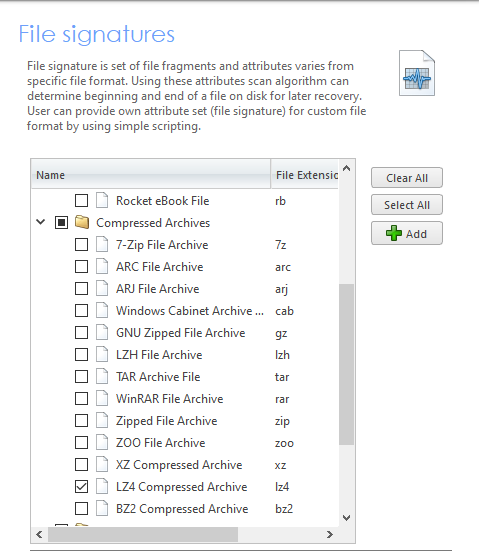
Recover BZ2 files with Active@ UNDELETE
- History: The BZ2 format, based on the Burrows-Wheeler transform and the Run-Length Encoding (RLE) algorithm, was created by Julian Seward in the late 1990s. BZ2 provides excellent compression ratio and has a slower compression and decompression speed compared to other formats like GZ or LZ4. BZ2 files are typically used for compressing large files, software distributions, or archives where a higher compression ratio is desired.
- Active@ UNDELETE and File Signatures: Active@ UNDELETE's File Signatures expertly identifies the distinctive structure of BZ2 files, allowing for the seamless recovery of deleted or damaged BZ2 archives. With Active@ UNDELETE, users can effortlessly restore their ZIP files and retrieve valuable data within them. To find and recover BZ2 files check bz2 in the File Recovery Wizard menu.
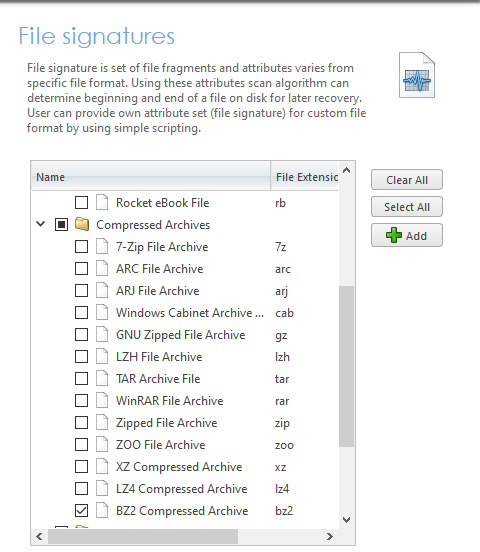
Conclusion
Active@ UNDELETE's File Signatures feature provides a dependable and efficient solution for recovering deleted or damaged compressed archive files. With its comprehensive scanning capabilities and the ability to recognize the unique structure and markers of various compressed archive file types, Active@ UNDELETE empowers users to effortlessly retrieve their valuable files. Whether it's a 7z, ARC, ARJ, CAB, GZ, LZH, TAR, RAR, ZIP, ZOO, XZ, LZ4, or BZ2 file, Active@ UNDELETE ensures users can recover their important data and regain access to the valuable information stored within these archives. With Active@ UNDELETE, retrieve your files and regain control of your data.

Conclusion
Active@ UNDELETE's File Signatures feature provides a powerful tool for users looking to recover deleted electronic books in various file formats, including djvu, fb2, lit, qbw, and rb. By identifying unique file signatures associated with each format, Active@ UNDELETE can effectively scan and recover lost or deleted e-books, ensuring that valuable content is not forever lost. Whether you are a casual reader or a dedicated collector of electronic books, Active@ UNDELETE can help you recover your cherished e-books and preserve them for future reading.
